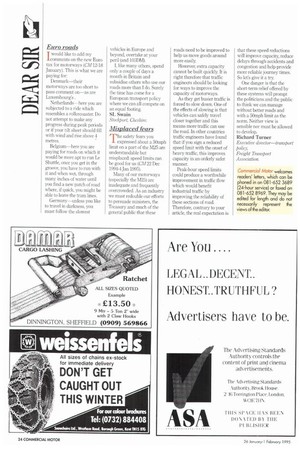Misplaced fears
Page 28

If you've noticed an error in this article please click here to report it so we can fix it.
The safety fears you expressed about a 50mph limit on a part of the M25 are understandable but misplaced: speed limits can be good for us (CM 22 Dec 1994-4 Jan 1995).
Many of our motorways (especially the M25) are inadequate and frequently overcrowded. As an industry we must redouble our efforts to persuade ministers, the Treasury and much of the general public that these roads need to be improved to help us move goods around more easily.
However, extra capacity cannot be built quickly. It is right therefore that traffic engineers should be looking for ways to improve the capacity of motorways As they get busier traffic is forced to slow down. One of the effects of slowing is that vehicles can safely travel closer together and this means more traffic can use the road. In other countries traffic engineers have found that if you sign a reduced speed limit with the onset of heavy traffic, this improves capacity in an orderly safer manner.
Peak-hour speed limits could produce a worthwhile improvement in traffic flow which would benefit industrial traffic by improving the reliability of these sections of road. Therefore, contrary to your article, the real expectation is that these speed reductions will improve capacity, reduce delays through accidents and congestion and help provide more reliable journey times. So let's give it a try.
One danger is that the short-term relief offered by these systems will prompt the politicians and the public to think we can manage without better roads and with a 50mph limit as the norm. Neither view is sensible nor must be allowed to develop.
Richard Turner Executive director—transport Policy, Freight Transport Association.




























































































